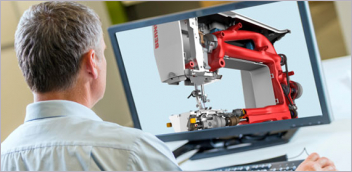
Latest News
February 5, 2021
The European Commission (EC) is funding a new project, SimCardioTest, to develop new predictive tools in cardiac pathology for in-silico trials of medical devices and treatments. Ten partners will participate in the project, which will be coordinated at Inria, the French national research institute for digital sciences.
Three cardiac use cases will demonstrate the platform effectiveness, along with the required verification & validation processes and certification support of the medical device or medicine. A unified web platform will enable companies to test the safety and efficacy of drugs and devices.
One of the participating companies, Netherlands-based InSilico Trials, has created a cloud-based platform for digital simulation and testing medical devices and pharmaceuticals. The company claims that modeling and simulation can reduce the cost of medical device and drug development by as much as 50%.
Digital Engineering spoke to InSilico Trials CEO Luca Emili about the potential for digital simulation in healthcare solution development.
What types of problems can simulation technology address in lifesciences development?
Luca Emili: To develop a drug requires an average of 12 years and billions of dollars in investment. For a medical device, it takes five years and $100 million investment. It is a lot of time and money, and just 5% of candidates actually become drugs available to market. Many times, you have to stop development related to safety concerns. Simulation for both devices and drugs is able to provide an indication on safety, very quickly in the initial phase of development.
That means you can invest money in something more promising, without wasting money on something that cannot be taken to market.
What is the benefit of using the InSilico Trials platform, versus a traditional simulation solution?
Luca Emili: The solution itself is cloud based and web based, so users can find on our website tools that are easy to use. And of course we have different tools for pharma or medical devices, so if you are developing a medical device, you can have an environment where you can select specific simulations that are important to you. The system is trained to apply a lot of very specific effects on the device to represent what can happen in a real world environment.
Can you describe some of the background tools and algorithms that you leverage for the solution?
Luca Emili: In the background of our interface, there are basically two components. First are the solvers, so we have different engines coming from the most important companies like Ansys and Dassault, Mathworks, etc., so we have complex and powerful tools that let the simulation be executed. The second element is linked to our strategy that we call crowd science. We have on the platform simulation coming from universities and research centers.
We integrate those simulations on our platform, so the engine can execute that simulation and then combine it with human data and the work of specific research groups. The simulation itself is the outcome of years of activity and experience, and every simulation is coming from a highly professional researcher or professor or research team.

Can you describe how the regulatory environment is changing to accommodate simulation along with physical testing and clinical trials?
Luca Emili: Automotive and aerospace are highly regulated environments, and companies are using 100% modeling and simulation for development of new products. Everyone does everything with modeling and simulation. In healthcare, the budget going to modeling and simulation is about 1% of the total compared to lab testing.
At the moment,regulators in Europe are pushing companies to use modeling and simulation for testing and for internal decision making. Because these tools are so efficient and fast to use at the beginning of the process compared to a clinical trial, it does not makse not to use them.
The problem is that these are complex tools and require expertise, so at InSilico Trials we have democratized simulation. Both the FDA in the U.S. and the European Medicines Industry (EMA) are pushing the use of modeling and simulation.
What has the market response to the solution been so far?
Luca Emili: We closed an investment round last year, and we are now going to market in a more structured way. We are in talks with pharmaceutical companies and we are also working with some smaller, emerging biopharma companies and contract research organizations (CROs).
In light of the way the pandemic affected engineering work and remote collaboration, what have you learned in the past year about the benefits of this approach,and what twork still needs to be done?
Luca Emili: I think that to be resilient was one of the lessons of 2020. And we as a company have been resilient because we were structured to use technology not only to collaborate with customers, but also among ourselves.
We are a highly digital company that has decided to work in a digital way, and to embed that approach into our product.
In 2021, I think that a company will need to have something that they know is reliable, persistent and accessible in every kind of organizational situation. A web-based platform provides an answer because you can perform these simulations online. As people get back to work, you can disperse this functionality around the world. You are creating an environment ath is like an ERP solution for research and development. It is persistent and something that can help the organization when there is a crisis or the lab is closed.
Subscribe to our FREE magazine, FREE email newsletters or both!
Latest News
About the Author
Brian Albright is the editorial director of Digital Engineering. Contact him at de-editors@digitaleng.news.
Follow DE




